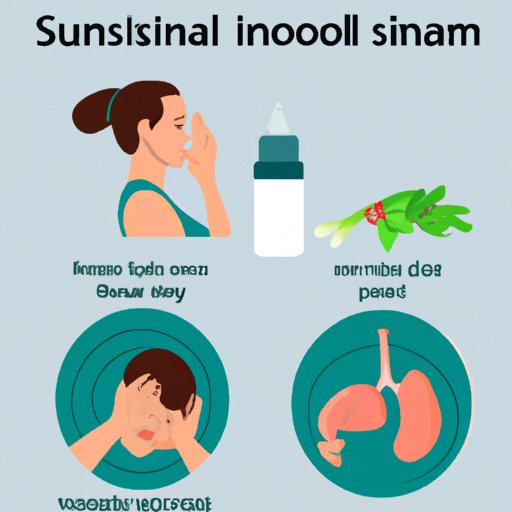
Introduction
Sinus inflammation, also known as sinusitis, occurs when the tissues lining the sinuses become swollen and inflamed, causing blockages and discomfort. This condition can be caused by allergies, infections, environmental irritants, and other factors. Symptoms of sinusitis include facial pain, headaches, nasal congestion, and post-nasal drip. In this article, we will explore various approaches to reduce sinus inflammation.
Home Remedies
Home remedies are a great first-line treatment for reducing sinus inflammation. Here are some remedies that can help:
Saline nasal sprays
Saline nasal sprays can help to flush out the sinuses and reduce inflammation. They are available over-the-counter or can be made at home by mixing salt, baking soda, and warm water. To use, simply spray the solution into each nostril while tilting your head back.
Steam inhalations
Steam inhalations can help to reduce congestion and inflammation. You can create steam by filling a bowl with hot water and placing a towel over your head while you breathe deeply. You can also add essential oils like peppermint or eucalyptus to the water for added benefits.
Warm compresses
Applying a warm compress can help to reduce sinus pain and pressure. Simply soak a clean towel or washcloth in warm water and place it over your face for a few minutes.
Neti pots
Neti pots are similar to saline nasal sprays in that they help to flush out the sinuses. They are small, teapot-like devices that you fill with a saline solution. To use, tilt your head to one side and insert the spout in one nostril, pouring the solution through and out the other nostril.
When using home remedies, it is important to follow instructions carefully and avoid overusing them, which can cause further irritation. Also, be sure to use clean equipment to prevent infection.
Foods to Eat (and Avoid)
Diet can play a significant role in reducing inflammation throughout the body, including in the sinuses. Here are some foods to focus on and avoid:
Antioxidant-rich fruits and vegetables
Fruits and vegetables that are high in antioxidants and vitamin C can help to reduce inflammation. Examples include citrus fruits, berries, kale, spinach, and broccoli.
Spices like turmeric and ginger
Spices like turmeric and ginger have anti-inflammatory properties that can help to reduce sinus inflammation. Try incorporating them into your cooking or taking them as supplements.
Lean protein sources
Foods high in lean protein, like chicken and fish, can also help to reduce inflammation. Avoid red meat and processed meat, which can increase inflammation.
Sugar, dairy, and processed and fried foods
Sugar, dairy, and processed and fried foods can all contribute to inflammation. Try to limit your intake of these foods as much as possible.
Yoga Poses
Yoga can help to reduce stress and tension in the body, which can contribute to sinus inflammation. Here are some yoga poses that can help:
Cat-Cow stretch
To do the Cat-Cow stretch, get into a tabletop position on your hands and knees. Inhale as you arch your back and lift your head (Cow pose), then exhale as you round your spine and tuck your chin (Cat pose). Move back and forth between the two poses, syncing your breath with your movements.
Downward-Facing Dog
To do Downward-Facing Dog, start in a plank position with your palms and toes on the floor. Exhale as you lift your hips up and back, straightening your arms and legs. Lengthen your spine and engage your core.
Forward Fold
To do Forward Fold, stand with your feet hip-width apart. Exhale as you fold forward, reaching for your toes or the floor. Keep your knees slightly bent if necessary.
Cobra pose
To do Cobra pose, lie face-down on the floor with your hands under your shoulders. Inhale as you lift your chest off the floor, keeping your elbows close to your sides.
When practicing yoga, it is important to start slow and listen to your body. Avoid pushing yourself too hard or putting yourself in positions that cause discomfort.
Supplements
In addition to diet and home remedies, supplements can also help to reduce sinus inflammation. Here are some supplements to consider:
Vitamin C
Vitamin C is an antioxidant that can help to reduce inflammation and boost the immune system. You can get vitamin C from citrus fruits, berries, and supplements.
Omega-3 fatty acids
Omega-3 fatty acids have anti-inflammatory properties and can be found in fatty fish like salmon and sardines, as well as supplements.
Probiotics
Probiotics are good bacteria that can help to boost the immune system and reduce inflammation. You can get probiotics from yogurt, kefir, and supplements.
As with any supplement, it is important to speak with a doctor before taking them to avoid any potential interactions or side effects.
Medical Treatments
If home remedies, diet, yoga, and supplements do not provide enough relief, medical treatments may be necessary. Here are some common treatments for reducing sinus inflammation:
Nasal sprays
Nasal sprays can help to reduce inflammation and clear up congestion. They may contain corticosteroids or decongestants.
Allergy medications
If allergies are contributing to your sinus inflammation, allergy medications like antihistamines can help to reduce symptoms.
When using medical treatments, it is important to follow instructions carefully and avoid overusing them, which can cause side effects and rebound congestion.
Conclusion
Reducing sinus inflammation may require a combination of approaches, including home remedies, diet, yoga, supplements, and medical treatments. By incorporating these strategies into your daily routine and working closely with a doctor, you can find relief from sinus inflammation and improve your overall health and well-being.
Remember that everyone’s body reacts uniquely, so it is important that you find what works best for you and your body by evaluating how you feel after making changes. If your symptoms persist or worsen, be sure to speak with a doctor.




